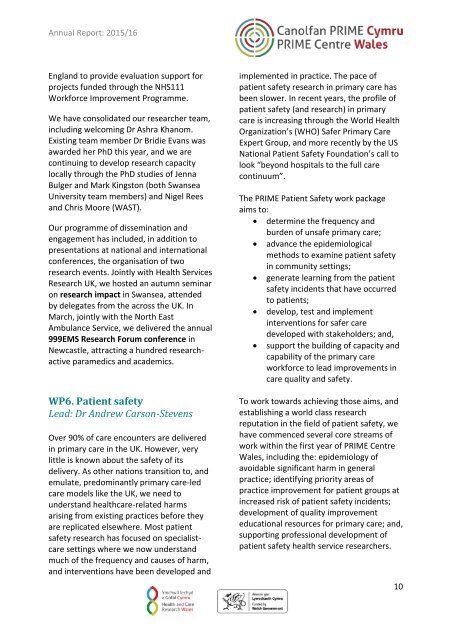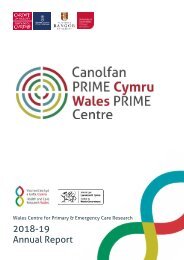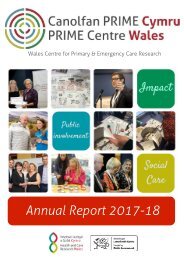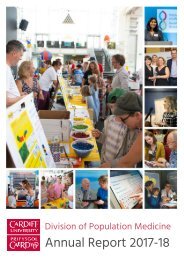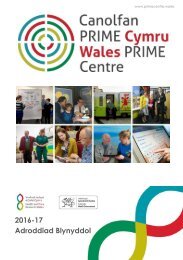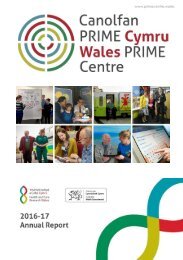PRIME Annual Report 2015-16
You also want an ePaper? Increase the reach of your titles
YUMPU automatically turns print PDFs into web optimized ePapers that Google loves.
<strong>Annual</strong> <strong>Report</strong>: <strong>2015</strong>/<strong>16</strong><br />
England to provide evaluation support for<br />
projects funded through the NHS111<br />
Workforce Improvement Programme.<br />
We have consolidated our researcher team,<br />
including welcoming Dr Ashra Khanom.<br />
Existing team member Dr Bridie Evans was<br />
awarded her PhD this year, and we are<br />
continuing to develop research capacity<br />
locally through the PhD studies of Jenna<br />
Bulger and Mark Kingston (both Swansea<br />
University team members) and Nigel Rees<br />
and Chris Moore (WAST).<br />
Our programme of dissemination and<br />
engagement has included, in addition to<br />
presentations at national and international<br />
conferences, the organisation of two<br />
research events. Jointly with Health Services<br />
Research UK, we hosted an autumn seminar<br />
on research impact in Swansea, attended<br />
by delegates from the across the UK. In<br />
March, jointly with the North East<br />
Ambulance Service, we delivered the annual<br />
999EMS Research Forum conference in<br />
Newcastle, attracting a hundred researchactive<br />
paramedics and academics.<br />
WP6. Patient safety<br />
Lead: Dr Andrew Carson-Stevens<br />
Over 90% of care encounters are delivered<br />
in primary care in the UK. However, very<br />
little is known about the safety of its<br />
delivery. As other nations transition to, and<br />
emulate, predominantly primary care-led<br />
care models like the UK, we need to<br />
understand healthcare-related harms<br />
arising from existing practices before they<br />
are replicated elsewhere. Most patient<br />
safety research has focused on specialistcare<br />
settings where we now understand<br />
much of the frequency and causes of harm,<br />
and interventions have been developed and<br />
implemented in practice. The pace of<br />
patient safety research in primary care has<br />
been slower. In recent years, the profile of<br />
patient safety (and research) in primary<br />
care is increasing through the World Health<br />
Organization’s (WHO) Safer Primary Care<br />
Expert Group, and more recently by the US<br />
National Patient Safety Foundation’s call to<br />
look “beyond hospitals to the full care<br />
continuum”.<br />
The <strong>PRIME</strong> Patient Safety work package<br />
aims to:<br />
determine the frequency and<br />
burden of unsafe primary care;<br />
advance the epidemiological<br />
methods to examine patient safety<br />
in community settings;<br />
generate learning from the patient<br />
safety incidents that have occurred<br />
to patients;<br />
develop, test and implement<br />
interventions for safer care<br />
developed with stakeholders; and,<br />
support the building of capacity and<br />
capability of the primary care<br />
workforce to lead improvements in<br />
care quality and safety.<br />
To work towards achieving those aims, and<br />
establishing a world class research<br />
reputation in the field of patient safety, we<br />
have commenced several core streams of<br />
work within the first year of <strong>PRIME</strong> Centre<br />
Wales, including the: epidemiology of<br />
avoidable significant harm in general<br />
practice; identifying priority areas of<br />
practice improvement for patient groups at<br />
increased risk of patient safety incidents;<br />
development of quality improvement<br />
educational resources for primary care; and,<br />
supporting professional development of<br />
patient safety health service researchers.<br />
10


